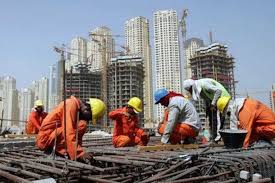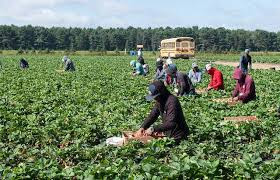Do we really want to be the country that prevents people from taking care of their families; the country that thwarts any attempt for migrants to find a better life? I thought the motto of the Statue of Liberty was "Give me your tired, your poor, Your huddled masses yearning to breathe free, The wretched refuse of your teeming shore. Send these, the homeless, tempest-tossed to me, I lift my lamp beside the golden door!"
What happened between then and now to make our country so unwelcoming? I am appalled by the actions of some of our state governors and felt I needed to post this about how migrant workers help our nation.
We've not discussed this issue before, but we will again be visiting it in the near future to address the plight of women migrant workers in the United States. Be sure to look for it!
Migrant workers have played a vital role in the economic landscape of the United States for decades. These hardworking individuals leave their home countries in pursuit of better opportunities, contributing significantly to the nation's economic growth and cultural diversity. In this blog post, we will explore the essential role that migrant workers play in the US economy, their contributions, challenges they face, and the importance of embracing a more inclusive and supportive approach towards them.
Understanding Migrant Workers:
Migrant workers are individuals who relocate from their native countries to work in foreign lands temporarily or permanently. In the US, they typically seek jobs in industries such as agriculture, construction, hospitality, healthcare, and technology, among others. These workers come from diverse backgrounds and possess a wide range of skills and talents, making them a valuable asset to the country.
Economic Contributions:
Migrant workers contribute significantly to the US economy by providing the labor force necessary for industries facing labor shortages. Their participation fills gaps in the job market and supports various economic sectors. In turn, this enhances productivity, increases output, and fosters economic growth.
Agricultural Sector:
The agriculture industry heavily relies on migrant workers to perform physically demanding tasks, such as planting, harvesting, and packaging crops. Their seasonal labor ensures a stable food supply and keeps food prices affordable for consumers.
Construction Industry:
Migrant workers play a crucial role in the construction sector, aiding in the development of infrastructure, housing, and commercial spaces. Their skills and dedication contribute to the growth of the real estate industry.
Hospitality and Tourism:
The hospitality and tourism industries benefit from the contributions of migrant workers in hotels, restaurants, and various entertainment venues. Their presence enhances customer service and overall guest experience.
Healthcare Sector:
Migrant workers are often employed in the healthcare field as nurses, medical technicians, and caregivers. They address the increasing demand for healthcare services and support the aging population.
Technological Advancements:
In the technology sector, migrant workers bring diverse perspectives and expertise. Many foreign-born professionals contribute to innovations, research, and development, making the US a global leader in technology.
Taxes and Social Security:
Migrant workers pay taxes, including income and payroll taxes, which contribute to government revenue. Additionally, they often contribute to Social Security and Medicare, supporting the welfare of retirees and individuals with disabilities.
Cultural Enrichment:
Migrant workers bring a rich tapestry of cultures, traditions, and languages to the US. Embracing diversity enhances the country's social fabric and fosters a more inclusive society.
Challenges Faced by Migrant Workers:
Despite their significant contributions, migrant workers face various challenges. These may include language barriers, legal issues, social isolation, and exploitative work conditions. Recognizing and addressing these challenges is essential for promoting fair labor practices.
Immigration Policies and Reforms:
A comprehensive and compassionate immigration policy is vital for recognizing the contributions of migrant workers. Implementing reforms that protect their rights and offer pathways to legal status will lead to a more just society.
Education and Skill Development:
Investing in education and skill development for migrant workers benefits both the individuals and the nation. Equipping them with marketable skills ensures their economic stability and enhances their overall contributions to the US economy.
Advocacy and Support:
Supportive organizations and advocacy groups play a significant role in addressing the needs of migrant workers. They provide resources, legal aid, and assistance with integration, fostering a stronger sense of community.
Impact of COVID-19:
The COVID-19 pandemic highlighted the essential role of migrant workers, especially in sectors like healthcare and food supply. Recognizing their contributions during crises and providing them with adequate support is crucial for national resilience.
Migrant workers are an integral part of the US economy, driving growth and diversity. Their contributions across various industries enrich the nation's fabric and propel economic prosperity. Embracing inclusive policies, supporting education, and advocating for their rights will create a more equitable and flourishing future for all.
Resources:
Migrants Bring Economic Benefits for Advanced Economies
Benefits of Immigration Outweigh the Costs







